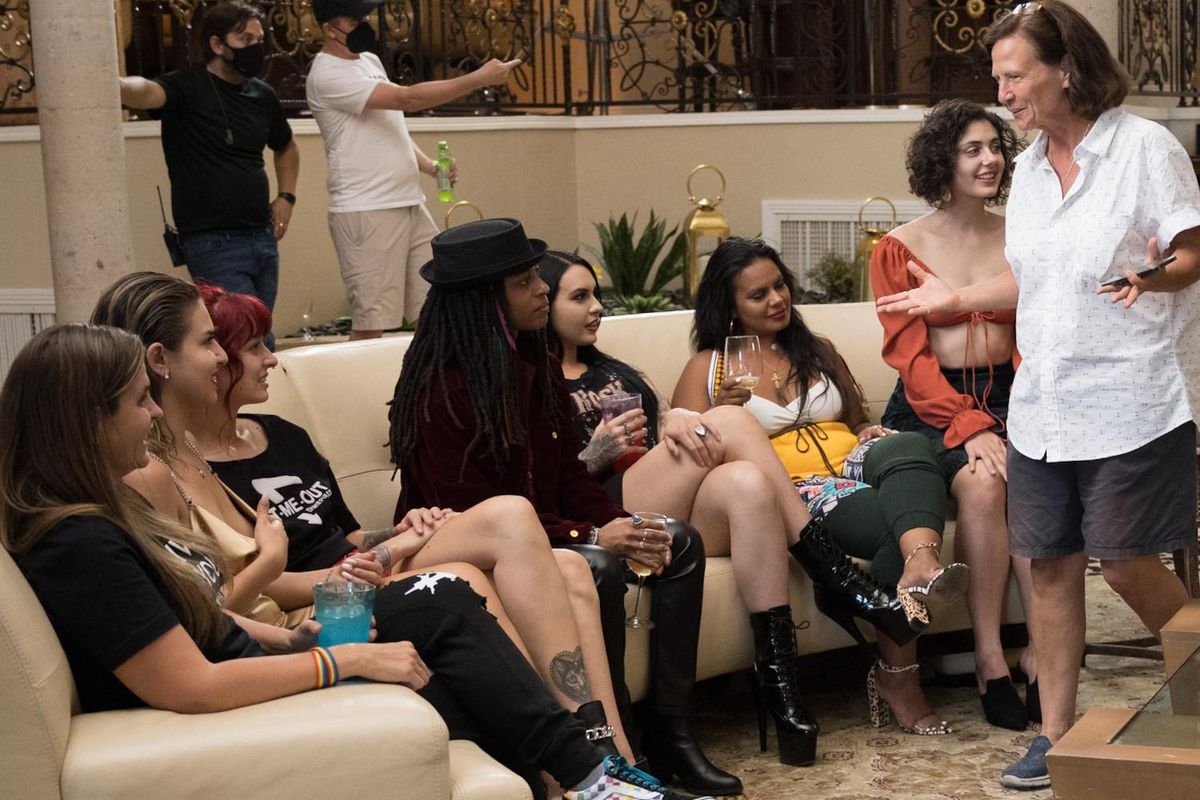Coming Out for Love Dating Show
Coming Out for Love (“COFL”), the new LGBTQ dating competition series from prolific queer filmmaker Nicole Conn (A Perfect Ending, Elena Undone, More Beautiful For Having Been Broken) will host a live event watch-party for viewers on Valentine’s Day, featuring host Jessica Clark, director Nicole Conn, and the contestants vying for love. The official series run will begin on Saturday, February 18, 2023, with the re-airing of Episode 1 in its entirety.
Bucking the typical ad-supported model for series distribution, COFL is giving multiple platforms the opportunity to revenue share with an innovative new referral model funneled through global streaming platform Lesflicks.com. All episodes and bonus content will be available via Lesflicks. Individual 72-hour episode rentals or access to tiered 6-month packages are available now. Bonus content includes access to livestream events, exclusive promotional and behind-the-scenes footage, and the offshoot show, Coming Out After Dark, hosted by comedian/emcee Shawba McLaughlin. Viewers can also access the series through AppleTV, AndroidTV, Roku, and FireTV.

The subscriber livestream watch party of Episode 1 “Getting To Know You,” will begin at 12 noon PST on Tuesday, February 14, 2023. Episode 1 will be replayed on Saturday, February 18; Episode 2: “The N Word,” will air February 25 and new episodes will continue to drop each Saturday, March 4 through June 3, 2023.
Host Jessica Clark, LGBTQ+ icon and activist, guides the sixteen queer women living together under one roof through emotional and physical challenges to win weekly keys that unlock the heart of Season One’s Single and Key Master, influencer, and activist Amber Whittington.
Episode 1 introduces all sixteen women to Whittington and explains the format of the competition. Episode 2, titled “The N Word,” unexpectedly dives into a sensitive racial conversation that showcases raw and emotional exchanges from the Black, Asian, Latina, and deaf contestant’s perspectives; a very real example of the sensitive issues the show does not avoid or sugarcoat. Racy sexual encounters and not so “pc” moments build week by week.
Conn reiterates, “We couldn’t be prouder of this incredibly diverse and talented cast. The environment we created truly became a safe enough one that these women felt comfortable exposing themselves, literally and figuratively! The very real exchanges and emotions, for better or worse, are incredibly eye-opening.”

Naomi Bennett, CEO of Lesflicks shares, “We created Lesflicks to create a better option for connecting sapphic stories with their audience. We’re delighted to be working with Nicole Conn and Pelican Films to do just that with Coming Out For Love. At a time when streaming platforms and TV networks are in turmoil, trying to find sustainable ways to deliver content to audiences, we’re proud to be paving the way forward with a new innovative solution.”
The 16-episode series, from Nicole Conn Films Global in partnership with Just Jo Productions and Pelican Films, was filmed entirely on location at the Palm Palace in Palm Springs, CA, and features a veritable Who’s Who of queer celebrities as judges and guests, including Sedona Prince (Oregon Ducks basketball star), Stoney Michelli Love (CEO and founder of Stuzo Clothing), Caroline Rose Giuliani (filmmaker, political activist, writer), Whitney Mixter (Showtime’s The Real L Word), Jill Osur (gender, racial and social activist, CEO Teneral Cellars wines), fashion designer Nik Kacy (founder of Equality Fashion Week ), Franco Stevens (Curve) and her wife, Jen Rainin (Ahead of the Curve), Tisha Floratos-Silano with Olivia Travel, singer/songwriter Tanerélle, and country music singer, Brooke Eden.

About NCFG
Nicole Conn Films Global is an international group dedicated to the funding and supporting of quality narrative features in the 21st Century. We are committed to producing quality and entertaining Feature Films, Documentaries, and TV/Web Series made By Us, About Us, And Now, For All of YOU!!! For the past few decades, you have invited us into your living rooms, and now we'd like to invite you into ours. Our mission is to keep Quality Diverse Cinema alive and thriving, always building our library as well as inviting and mentoring Membership Artists who wish to be involved with films. Nicoleconnfilmsglobal.com
First launched in 2005, Pelican Films has since expanded with branches in 3 states. Pelican Films has produced nearly 30 films, shooting in 5 states and 2 countries, and winning dozens of awards in the process. From low-budget independent films to multi-million dollar projects, Pelican Films has had tremendous success in the film industry. In 2021 alone, the company has 5 films set to hit the market. Pelicanfilms.com
Lesflicks is a sapphic streaming platform that exists to bring together quality curated and authentic sapphic stories in one place, to make it easier for the audience to find what they're looking for whilst also ensuring creators are paid fairly for their work. We are proud to deliver a sustainable business model that ensures the growth of independent content creation along with ease of access for audiences. Lesflicks is one part of our vision for a sapphic utopia.
To learn more about the show please visit: comingoutforlove.com and follow the show on socials:
Facebook, Instagram, TikTok, and YouTube
- A Coming Out Day picnic in Clarksville ›
- Lila McCann, Country Singer, Introduces Fans to Her New Wife, Comes Out ›




 Photo by
Photo by  Photo by
Photo by  Photo by
Photo by  Tom Kowalski
Tom Kowalski Photo by
Photo by 

